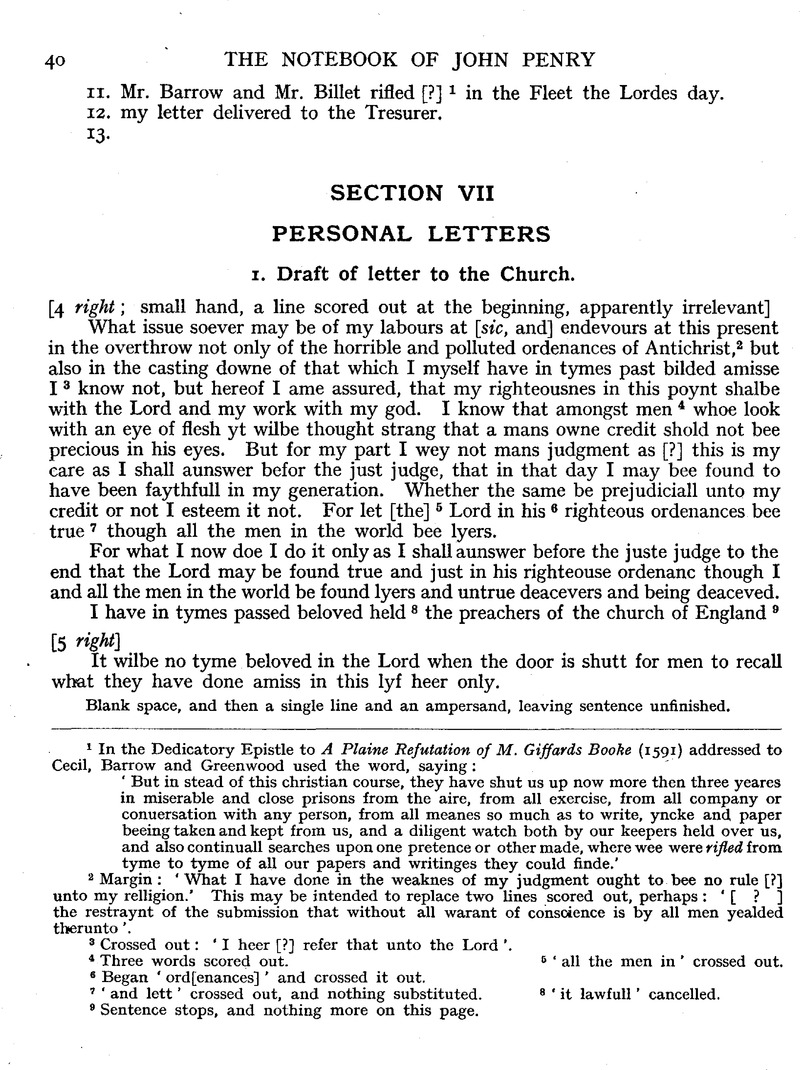No CrossRef data available.
Article contents
Section VII: Personal Letters
Published online by Cambridge University Press: 24 December 2009
Abstract

- Type
- The Notebook of John Penry, 1593
- Information
- Copyright
- Copyright © Royal Historical Society 1944
References
page 40 note 2 Margin : ‘What I have done in the weaknes of my judgment ought to bee no rule [?] unto my relligion.’ This may be intended to replace two lines scored out, perhaps : ‘[ ? ] the restraynt of the submission that without all warant of conscience is by all men yealded therunto’.
page 40 note 3 Crossed out: ‘I heer [?] refer that unto the Lord’.
page 40 note 4 Three words scored out.
page 40 note 5 ‘all the men in’ crossed out.
page 40 note 6 Began ‘ord[enances]’ and crossed it out.
page 40 note 7 ‘and lett’ crossed out, and nothing substituted.
page 40 note 8 ‘it lawfull’ cancelled.
page 40 note 9 Sentence stops, and nothing more on this page.
page 41 note 8 ‘no’ cancelled.
page 41 note 9 For ‘unt[o]’.
page 41 note 10 For ‘the living’.
page 41 note 11 ‘teach’ written in.
page 41 note 12 Undeciphered word.
page 41 note 13 ‘the’ cancelled.
page 42 note 1 For Goodman, see D.N.B. ; C. H. Garrett, The Marian Exiles ; work on him to be published by Dr. A. F. Scott Pearson, author of Thomas Cartwright and Elizabethan Presbyterianism ; and especially J. H. Colligan, William Whittingham of Chester.
Goodman (1519–1603), after graduating, was appointed Margaret Professor of Divinity Oxford ; in exile at Strasburg, Frankfort (where he had a share in the ‘Troubles’ ) and Geneva, the latter place he became pastor of the English congregation, his colleague being John Knox. The two were close friends, and they were friends in adversity, drawing upon them the wrath of Elizabeth by their publications, Knox's First Blast of the Trumpet against the Monstrous Regiment Women, and Goodman's How Superior Powers ought to be obeyed of their Subjects, and wherein they may lawfully by Gods word be disobeyed and resisted. In 1559 Goodman went to Scotland, becoming minister at Ayr and St. Andrews successively, and it was not until 1565 that he ventured into England. In 1570 he received a living at Alford, near Chester (his native place, of which he received the freedom in 1581), but the following year he was deprived for nonconformity, and obliged to make a full recantation of his published opinions. From this time until his death seems to have lived in Chester, taking a prominent part in the life of the city. His family apparently had considerable means, and he had powerful protectors, but his own character and learning won him general respect. He was known to hold his views tenaciously. In 1578 when pressing for the appointment of Chadderton to the diocese, Aylmer urged Hatton to help sending ‘a governor to that place, which, I fear, as an unruly family without a steward, will by this long delay be hardly drawn to good order. There is in that county one Goodman, not unknown to her Majesty, who in the vacation will build one way more than the Bishop shall good while be able to pull down in that kind of curiosity’.
page 42 note 2 ‘of Christ Jesus’ crossed out.
page 42 note 3 For ‘regard’ crossed out.
page 42 note 4 Two letters crossed out after ‘never’.
page 42 note 5 May be ‘callinge’.
page 42 note 6 For ‘the lord’ crossed out.
page 42 note 7 Marginal reference : ‘(a) Deut. 12. 30. 31. 32’.
page 43 note 1 For ‘case’ crossed out.
page 43 note 2 Or ‘callinge’.
page 43 note 3 ‘in her’ repeated in carry-over from p. 70 left to p. 70 right.
page 43 note 4 ‘wise’ may be crossed out.
page 44 note 1 For ‘covenant’ crossed out.
page 44 note 2 We should expect ‘loose’, but the word looks like ‘hoosh’.
page 44 note 3 ‘therof’ crossed out.




